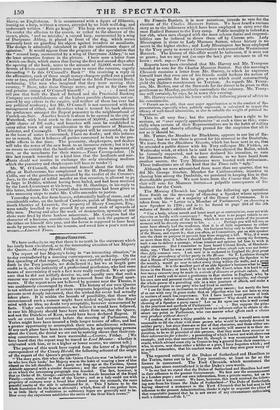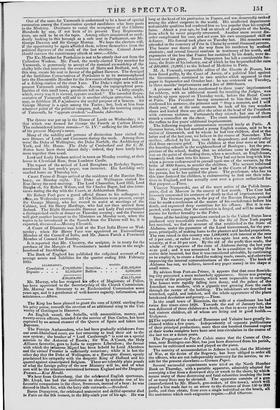Sir Francis Burdett, it is now notorious, intends to vote
for the election of Sir Charles Manners Sutton. We have heard a curious
story as to the influences which have been employed to carry over the once Radical Baronet to the Tory camp. Public morality is indeed at a lute ebb, when men charged with the most solemn duties and responsi- bilities can be induced to throw them off by Cireean arts. Lady Blessington is sister to Lady Manners Sutton, whose history is no i
secret n the higher circles ; and Lady Blessington has been employed by the Tory party to weave a Conservative web around the Westminster Baronet. The history of this affair would be ludicrous, if it were not so grave ; but we may not (so says the law) give utterance to all we
know: verb. sup.—True Sari.
. Reports have been circulated that Mr. Harvey and Mr. Tennyson intended to vote for Sir Charles Manners Sutton. But this morning's Chronicle contains a letter from Mr. Harvey, in which he expresses himself hurt that even one of his friends could harbour the notion of its being possible for him to give a vote which could constructively yield the slightest countenance to Toryism. As regards Mr. Tenny- son, Mr. Barker, one of the Stewards for the dinner to be given to that gentleman on Monday, positively contradicts the calumny. Mr. Tenny- son will certainly, he says, be in town this evening.
Mr. Harvey concludes his letter with the following piece.of advice to his constituents.
" Permit me to add, that over eager apprehension as to the conduct of Re- presentatives, especially when publicly expressed, is calculated to impair the efficacy of well-timed admonition, as also to enfeeble the weight of political in- dependence." This is all very fine ; but the constituencies have a right to be anxious, or " over eagerly apprehensive " at such a time as this; espe- cially when certain of their Representatives are in the habit of tal/einy indiscreetly, and thereby affording ground for the suspicion that all is not as it should be.
Mr. Turner, the Member for Blackburn, appears in our list of Re- formers , but we fear there is ground for his removal to the Doubtfuls. We learn from the Blackburn Gazette, which has been sent to us, that Ile attended a public dinner with his Tory colleague Mr. Fielden, on Wednesday week, at which he is said to have abjured the Ballot, which he formerly supported, and to have declared his intention, to vote for Manners Sutton. At the same dinner, as we have beard from another source, the Tory Ministers were toasted with enthusiasm. These indications are of the kind that the Times calls" ugly."
. Although we were admonished from more than one quarter, that we did Mr. George Sinclair, Member for Caithnessshire, injustice in classing him among the Doubtfuls, we persisted in keeping him in that discreditable position. We now learn from the Courier that Mr. Sin- clair will vote for Manners Sutton—a palpable consequence of his fondness for the Court.
The Morning Chronicle has supplied the following apt quotation from Swift on the necessity of choosing a Speaker whose opinions concur with those of a majority of the House of Commons. It is taken from his " Letter to a Member of Parliament," on chooaing rs new Speaker in 1708; and is to be found at page 264 of the 5th volume of Scott's edition of Swift.
" Can a body, whose mouth and heart must go so contrariwise, ever act with sincerity or hardly with consistency ? Such a man is no proper vehicle to re- tain or convey the sense of the House, which in so many points of the greatest moment will be directly contrary to his. . . . Perhaps you will tell me, as some have already had the weakness, that it is of little importance to either party to have a Speaker of their side, his business being only to take the sense of the Ilouse, and report it ; that you often, at Committees, put an able speaker into the chair on purpose to prevent him from stopping a bill. Why, if it were no more than this, I believe I should hardly choose, even among my footmen, such a one to deliver a message, whose interest and opinion led him to wish it might miscarry. But I remember to have heard Colonel Birch, of Hereford.. shire, say, ' That he was a very sorry Speaker whose single vote was not better than fifty common ones. I am sure it is reckoned in England the first great test of the prevalency of either party in the House. Sir T. Lyttletou thought that a House of Commons with a stinking breath (supposing the Speaker to be the mouth), would go near to infect every thing within the walls, and a great deal without. It is the smallest part of an able Speaker's business what he = forms in the House ; at least, if he be in with the Court, when it is hard toss how many converts may be made in a circle of dinners or private cabals. And you and I easily call to mind a gentleman in that station in England, who, by his own acts and personal credit, was able to draw over a majority, and change the whole power of a prevailing side in a nice juncture of affairs, and make a Parliament expire in one party who had lived in another. " I am far from an inclination to multiply party causes ; but surely the best of us can with very ill grace make that an objection who has not been so nice in matters of much less importance. Yet I have heard some persons of both sides gravely deliver themselves in this manner—' Why should we make the choosing of a Speaker a party cause ? Let us fix upon one who is well versed in the practices and methods of Parliament.' . . . But suppose the prin- ciples of the most artful Speaker would have no influence either to obtain or oh- struct any point in Parliament, who can answer what effects such a choice may produce without doors? " I confess, if it were a thing possible to be compassed, it would seem most reasonable to fill the chair with some person who would be entirely devoted to neither party ; but since there are so few of that character, and those either un- qualified or unfriended, I cannot see how a majority will answer it to their re- putation, to be so ill provided of able persons, that they must have recourse to their adversaries for a leader ; a proceeding of which I never met with above one example, and even that succeeded but ill, though it was recommended by an oracle, which advised some city in Greece to beg a general from their enemies,— who, in scorn, sent them either a fiddler or a poet, I have forgotten which ; and so much I remember, that his conduct was such that they soon grew weary of him." The reported ratting of the Dukes of Sutherland and Hamilton to the Tories, turns out to be a Tory invention, at least as far as the former is concerned. The York Chronicle, which mentioned the report, has since contradicted it in the Duke's own words. " In our last we stated that the Dukes of Sutherland and Hamilton had sent in their adhesion to the present Government. We first saw the announcement in a London paper ; and our own information, from a private source, led us to believe that it was correct. We have, however, this week received the follow- ing note from his Grace the Duke of Sutherland= The Duke of Sutherland" having observed a statement in the Yorh Chronicle that he had sent.in his adhesion to the present Administration, thinks it right to acquaint the editor. of that respectable journal that he is act aware of any circumstance authornuaL such a stateinev.t.,—Feb.
One of the seats for Yarmouth is understood to be a bone of special contention among the Conservative ejected candidates who have posts in the Ministry. Overtures to cause the acceptance of the Chiltern Hundreds by one, if not bota of its present Tory Representa- tives, are said to be on the tapis. Among others announced as confi- dently looking to this borough as a safe seat in Parliament, ure Mr. George Dawson and Sir George Murray. We hope the electors will, if the opportunity be again afforded them, relieve themselves from the political digraces of the result of the last election. Colonel Anson should canvass the constituency afresh at once.—Globe.
The Ex-Member for Perthshire is not to be utterly shut out from the Collective Wisdom. Mr. Praed, the newly-elected Tory member for Yarmouth, is generously to accept of the nominal stewardship of the chalky hills that intersect the counties of Herts and Bedford, and, in this way, vacate his seat in favour of the gallant Baronet. The demigod of the fastidious Conservatives of Perthshire is to be metamorphosed into the Honourable Member for the few curers of herrings and mackerel of a fishing-station of the river lace. The Duke's right arm will re- present Yarmouth suitably enough. Among the topographical pecu- liarities of this small town, gazetteers tell us there is "a lofty steeple, which, every way it is viewed, appears crooked." The intended Repre- sentative of Yarmouth will add to it another oblique attraction, which may, to faithless M. P.s,:subserve the useful purpose of a 'beacon. Sir George Murray is a spire among the Tories ; but, look at him from whatever point of the political compass, and, like the towering steeple of Yarmouth, he "appears crooked."—Dundee Advertiser.



























 Previous page
Previous page